ACH is the Annoying Little Thing We Can’t Live Without
January 19, 2015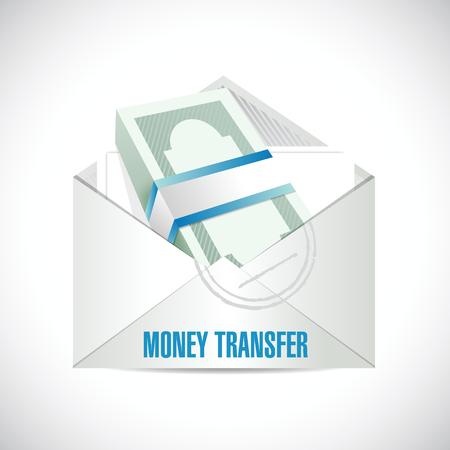 A few months ago I paid an invoice via ACH. The vendor was used to getting paid by check and didn’t accept credit cards. When I mentioned the funds would be paid overnight, they got excited but were suspicious. Would there be a fee to receive the money like a Fed wire might? “Nonsense,” I told them.
A few months ago I paid an invoice via ACH. The vendor was used to getting paid by check and didn’t accept credit cards. When I mentioned the funds would be paid overnight, they got excited but were suspicious. Would there be a fee to receive the money like a Fed wire might? “Nonsense,” I told them.
When the banks opened the next morning, they didn’t see it. The funds had been withdrawn from my account and I double checked that the account and routing number matched their voided check. They took no comfort in that verification of course because they didn’t see the money on “their side.” That put the burden on me to convince them nothing had gone wrong or that I wasn’t lying. “It should be there,” I told them. “Who knows, depending on your bank it might not post until tomorrow.”
Let’s spend all day researching this payment
Putting the blame on the recipient’s bank or the ACH system as an imperfect fluid thing that comes with no guaranteed delivery schedule only heightened their levels of suspicion.
If you’ve been in this situation before particularly when funding a merchant who claims the funds are not there, there is only so much you can say or do to pacify them.
“Can you give me some kind of confirmation number?” they ask. Ahh, the mythical confirmation number.
So you call your bank, get some kind of number and pass it along to them which their bank does nothing with because they have no record of any incoming payment.
At the vendor’s behest, I went back and forth between my bank and their bank to try and locate these funds. The quest to find the missing deposit took up the first six hours of my day. Honestly I wasn’t worried about it. I was pretty sure it would show up eventually, but the vendor was freaking out.
With the work day almost over, the receiving bank finally logged a pending deposit in the vendor’s account.
It was good enough for them. They finally believed me. Phew.
You got the money, right?
How do I know my vendor actually got the money? Well because they told me they did…
Good enough perhaps, but a few years ago I helped a merchant get financing that claimed they did not receive their funds even though I was pretty sure they did. I went through the whole shebang, ACH system this, your bank that, confirmation number this, let me double check that, etc.
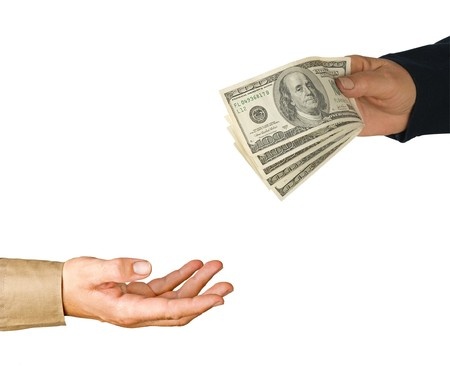 Three days later they claimed they still had not gotten it. It turns out they had but they knew without direct access to their bank account, we couldn’t confirm it, at least not in time to try and reverse the transaction successfully. Did we screw up somewhere? Was the routing number right? It’s a horrible feeling to believe you didn’t deliver what you promised you would to a merchant.
Three days later they claimed they still had not gotten it. It turns out they had but they knew without direct access to their bank account, we couldn’t confirm it, at least not in time to try and reverse the transaction successfully. Did we screw up somewhere? Was the routing number right? It’s a horrible feeling to believe you didn’t deliver what you promised you would to a merchant.
After more than a week we had figured out he not only received the cash, but had moved the money out of the account and bailed.
Once the money goes into the ACH system, you really don’t know anything. Some alternative lenders can confirm clients received deposits by requesting the client’s username and password to log into their bank account. This is a terribly flawed system.
Out there in the regular world I couldn’t have asked my vendor for the credentials to their online banking. Oh you didn’t get the ACH? Give me the password to your bank accounts, I’ll go have a good look.
You call this efficient?
In 2015 I can send money and have no idea if the other person got it. Somehow this is standard. It’s like e-mail in a way. I know I sent it but until they tell me they received it, who really knows.
There are obviously options to transfer money instantly but it comes at a great cost. And someone still has to tell me it got to the other side. I can’t confirm it myself.
In the age of the Internet, it’s amazing how inefficient payments are. We refer to modern payment processors as disruptive services, but it’s same problem with a different twist. Somebody pays you by credit card and the payment processor flags the sale, causing you to have to send documentation to their risk department to review. If rejected, the funds are held for six months and quite possibly your merchant account terminated. The customer won’t know all this though. All they knew is that their card was charged.
Intermediaries make transaction processing easy but they also make it really hard. The alternative lending industry spends entirely too much time managing payments.
The ACH debit was successful… or was it? Let’s wait 3 days to find out if it gets reversed before we really know for sure.
Did they get the money? Let me call them to confirm. Oh they didn’t pick up. I’ll write them an email asking them to confirm that they got my ACH.
They said they sent the money but I don’t see anything. Can you send me a confirmation number?
I sent you that email on thursday, you didn’t get it?
We’re used to a system where the only thing you can confirm is that something was sent and so we spend countless hours and money trying to figure out if they were received.
Meanwhile, in the future…err present day
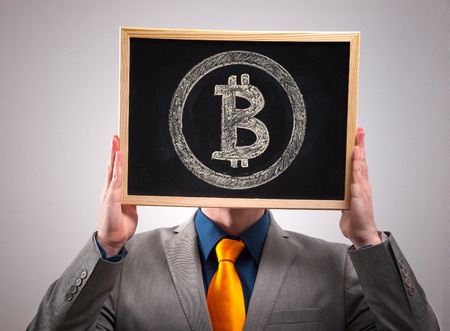 One of the most remarkable features about the Bitcoin system is that I can confirm that the money I sent was received by the other person. Everyone else in the world can confirm it too. The dollar/bitcoin balance of all bitcoin addresses are public and anyone can create a near infinite number of bitcoin addresses.
One of the most remarkable features about the Bitcoin system is that I can confirm that the money I sent was received by the other person. Everyone else in the world can confirm it too. The dollar/bitcoin balance of all bitcoin addresses are public and anyone can create a near infinite number of bitcoin addresses.
I joked before that in order to truly see with my own eyes that a vendor did not receive my ACH was to request the credentials to their online banking and log in. But all they need to do is generate a one-time use bitcoin address for the transaction and when I send funds, both they and I will see it deposited there, instantly.
Money sent, they got it instantly, I see it there, end of story.
Recently, .01 BTC was sent to this bitcoin address of mine: 19kzD1RkC8MjazfCkCJkfx7369ULCyPsg1
Check it out here: http://bitref.com/19kzD1RkC8MjazfCkCJkfx7369ULCyPsg1
or here: https://blockchain.info/address/19kzD1RkC8MjazfCkCJkfx7369ULCyPsg1
If you needed to pay me, I would click a “generate address” button on my computer, you send bitcoins to it, and there will be no doubt that they were received because you can view the balance of it yourself. I can keep the funds in that address or move them to another one. Even if moved, the paper trail that they were there remains. There is no uncertainty or research required.
So who confirms the transactions? Not the Automated Clearing House thank God. Bitcoin miners and nodes do. You can read about my experience as a miner here.
At present, the standard bitcoin network transaction fee is .0001 BTC, the equivalent of 2 cents. Transactions are also irreversible! No chargebacks!
You can send me a thousand dollars or a million dollars instantly for the price of 2 cents and view the balance in my receiving address as proof that I got it. Thousands of people do this every day.
Bitcoin’s adoption has been slow, it’s history volatile, and its reputation murky, but I pray everyday that a decentralized technology like this will last in the mainstream. The bureaucracy, inefficiency, and lack of transparency in other forms of payments are a drag on commerce.
If you’ve ever spent longer than a minute trying to figure out if money made it from point A to point B, you need to start learning about the Bitcoin system. If you’ve ever spent more than 2 cents sending money, you need to start learning about the Bitcoin system. And if you’ve ever had a payment processor give you a hard time about a transaction, you need to start learning about the Bitcoin system.
You might be happy with ACHs for now but we were all happy with telegrams once. That’s about the level of sophistication the mainstream payments industry has now. I can’t wait until this era is over.
Confessions of a Bitcoin Miner
December 18, 2014If you’re even vaguely familiar with Bitcoin, you’ve probably heard that you can mine them. It’s one of Bitcoin’s most unfortunate pieces of jargon because it sounds like a scam. We can’t mine U.S. Dollars so there’s no frame of reference for what enthusiasts are talking about. We can mine gold and silver of course, but how the heck can one mine a digital currency? It’s clear there’s more to Bitcoin than just being a form of money and that frightens people. It certainly frightened me.
 The first time I imagined bitcoin mining, I pictured sentinels from The Matrix drilling down with unrelenting intensity towards the last human city of Zion. Perhaps the humans were hoarding a vast trove of valuable bitcoins and a war was being waged to achieve digital hegemony. Like Ray in Ghostbusters, I couldn’t help it. The thought just popped in there.
The first time I imagined bitcoin mining, I pictured sentinels from The Matrix drilling down with unrelenting intensity towards the last human city of Zion. Perhaps the humans were hoarding a vast trove of valuable bitcoins and a war was being waged to achieve digital hegemony. Like Ray in Ghostbusters, I couldn’t help it. The thought just popped in there.
The next thought was that I better stay away from Bitcoin. It was easier to take the blue pill where “the [Bitcoin] story ends, you wake up in your bed and believe whatever you want to believe.” That’s what many consumers have done in the past. And who could blame them? I liked my life without Bitcoin in it, so why mess it up?
But the maniac I am, I took the red pill and explored just how the deep the rabbit hole goes.
I mined some bitcoins and the machines didn’t kill me, at least so far. I’m mining them right now as I type this. If you’re getting excited that I’m about to tell you that I’m getting rich while you fools sit on the sidelines, you’re going to be disappointed. There is no actual mining. It’s just slang for facilitating bitcoin transactions over the Internet. Womp womp. If people weren’t sending bitcoins back and forth, then there would be nothing to facilitate and therefore nothing to mine.
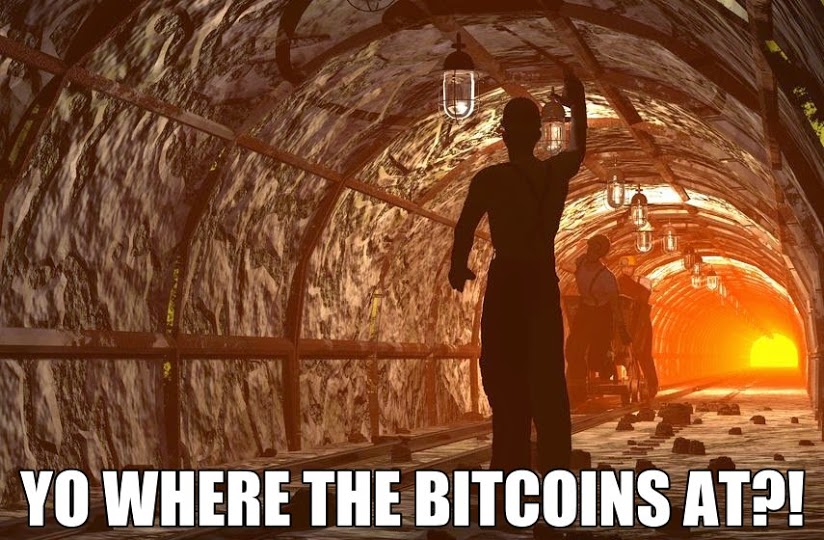 To illustrate simply, I’ll start off by reminding you that Bitcoin has no central authority. There is no Visa, no banks, and no Federal Reserve to sign off on a transaction. Instead Bitcoin transactions are validated by computers connected to the Internet running free Bitcoin software.
To illustrate simply, I’ll start off by reminding you that Bitcoin has no central authority. There is no Visa, no banks, and no Federal Reserve to sign off on a transaction. Instead Bitcoin transactions are validated by computers connected to the Internet running free Bitcoin software.
If I have 5 bitcoins and I send 3 to you, computers all over the world running this software are processing algorithms to validate this and make them permanent in a global ledger. The computers make sure you really have those bitcoins to send and then transfers them. You can’t create a fake bitcoin or spend one you’ve already spent because the Bitcoin system will know about it.
On just a single day there are nearly one hundred thousand bitcoin transactions. That’s too much for just a few computers to handle, not to mention that the processing power required to validate them is intense. Validating transactions requires lots of processing power and utilizing processing power has a cost in electricity.
So it pays
The Bitcoin system has a built in reward system to incentivize people around the world to keep the system in order. If your computer achieves a specific milestone while facilitating transactions, you are rewarded with bitcoins. Again, don’t get excited. These milestones are extremely rare to reach and totally random (for the record it’s called solving a block). You could facilitate transactions for 200 years and never get any bitcoins back as a reward.
But while random, it’s a probability game. The faster your processing power, the better your odds of being the lucky computer to receive the reward. That’s a necessary but unfortunate component to Bitcoin because there’s a built-in arbitrage opportunity. Why be a passive facilitator when you could arm your computer with a faster processor and rig the odds in your favor? If your computer was significantly faster than the other ones on the network, you could potentially get rewarded bitcoins often enough and with enough consistency to cover both the cost of your upgraded computer and the electricity to keep it cranked up.
And with that understanding, an international arms race began for increased processing power. Up until early 2013 you could quite easily profit from being a facilitator. Those folks didn’t see themselves as facilitators anymore but as miners. It wasn’t a passive activity. It was a business, like hauling ore out of a silver mine.
Today, so many people have tricked out their processors that it’s nearly impossible to get an edge. In fact, mining often results in losses. I have experienced a net loss in actual U.S. dollars through mining even though I’ve acquired fractions of bitcoins. Net loss? whuh?!
Forget about using your desktop or laptop to mine bitcoins. That’s so 2011. Engineers went on to build special hardware chips much better than household computers that do nothing other than process calculations for bitcoin transactions. Then came small boxes of chips, then large ones…
And when everyone started buying large bitcoin processing boxes, they began to buy two or three of them…
Then a stack of them…
Then a room full…
Then a warehouse full…
And of course a lot of additional money had to be spent on cooling, ventilation, and protecting against fires.
This is where a little problem started. Once everybody was using a million dollars worth of specialized hardware for speed and was spending tens of thousands of dollars per month on electricity, the edge was constantly being neutralized. Worse, the frequency that bitcoins are awarded per day does not increase. There will only be 21 million bitcoins ever placed in circulation. They’re awarded through mining at a fixed frequency. You can try to be the recipient of each reward but the frequency of which they’re awarded doesn’t increase.
Bummer for those that have amassed nuclear arsenal sized mining operations.
But also bummer for me. This is the extent of my mining equipment.
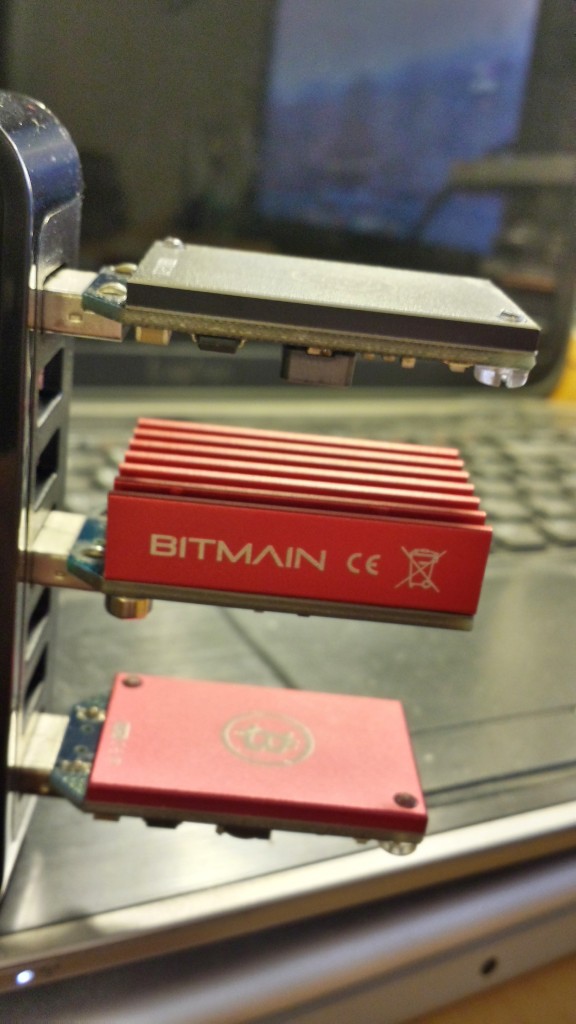
I have three small mining chips all connected via a USB strip. The outer pieces are ASICMiner Block Erupters and between them is a Bitmain Antminer U2. They run 24/7 connected to my home laptop. I can monitor their activity through this little window on my screen:
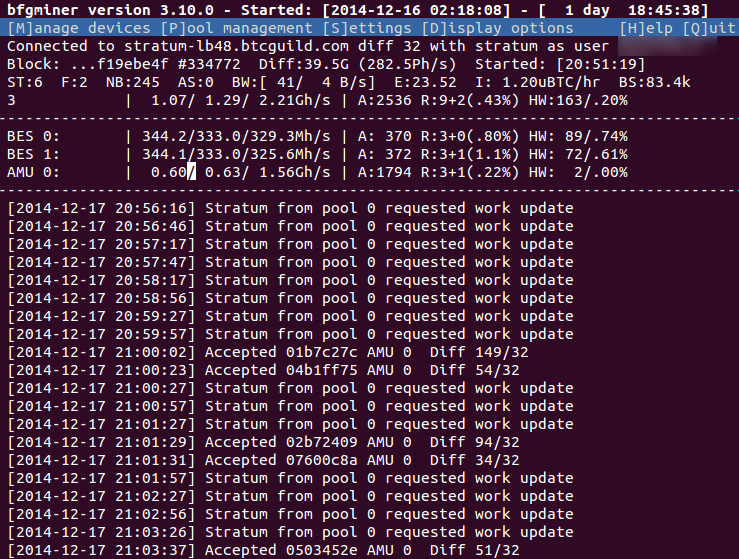
Combined they are crunching out an average of 2.2 Giga hashes (GH/s) per second, a speed so insignificant compared to the network’s competition that I will probably die without ever receiving a reward of bitcoins.
Unless…
Join forces
There’s a trick to mining to ensure you don’t die rewardless. You can combine your processing power with other miners and leverage your chances. Then if the group’s effort yields a reward, it’ll be distributed on a prorated basis. Someone got this idea a long time ago and in today’s ultra competitive environment, it’s practically a must.
They’re called mining pools. Pools aren’t just a couple of friends, they’re nearly small cities of miners working together collaboratively. The pool I mine in (BTC Guild) has 14,000 to 16,000 users mining together at any one moment and a single user could have an entire warehouse full of mining equipment. In the last hour, the fastest user provided 1,047,666.38 GH/s worth of power to our pool. That’s 476,211x more than what I contributed and he is just 1 of 15,000 users in our pool. woah!
What’s even more wild is that BTC Guild only makes up 5% of the world’s Bitcoin mining power. And yet because I am part of that pool I am paid a prorated amount for every reward the team earns. Surprisingly, that number is not zero. Running 24/7, I am earning an average of 60,000 satoshis a month.
The exchange rate of Bitcoin is extremely volatile but at this moment 60,000 satoshis is equivalent to 19 cents. Yes, 19 cents per month!
And don’t forget that the mining chips cost money to buy and running them 24/7 runs up more than 19 cents worth of electricity used. This means Bitcoin mining isn’t about getting rich. I’m losing money mining. It’s a hobby or benefit conferred upon the digital currency system to keep it running smoothly and accurately. Well at least for me…
Remember that miner that’s out-processing me on a scale of 476,211 to 1? He’s earning about $90,000 per month. I don’t know what his expenses are to run an operation like that but I’m sure it’s not cheap. His biggest enemy is that the value of Bitcoin to the dollar has fallen pretty heavily this year. $90,000 a month in revenue could become $45,000 a month just through exchange rate risk. Those are pretty high stakes to gamble with. But it could also become $180,000!
And whether the big players like that mine or don’t is irrelevant. Whether he makes money or not doesn’t matter. Arbitrage opportunities in the facilitation of transactions is for ultra geeks with big bucks. Mining as a hobby is for regular geeks. It’ll cost some money to do but you get to contribute to a system you believe in.
As for you, the potential average currency user, mining is not really of any consequence. The facilitation of digital transactions already happens with dollars, euros, and pounds. In My Journey to Bitcoin, I explained that buying a cup of coffee with a credit card requires 8 people to get paid for the transaction. Sure the process is completely different for Bitcoin but so what? Bitcoin is unique.
The problem is the mining terminology. It should be called facilitation but that doesn’t sound sexy especially if you are trying to convince an investor to give you $1 million to take advantage of potential arbitrage opportunities on the network.
And that’s about it. The real story behind mining isn’t so scary and you won’t necessarily be at any disadvantage if you still have no idea what the hell mining is. Bitcoin is full of technical nonsense best left to geeks, but you as an actual currency user do not have to worry about a lot of it.
If you’re at all like me though, obsessively curious about how things work and excited to try them out, I’m happy to clue you into the mechanics of mining and even get into the finer details behind it.
An ASIC Block Erupter costs about $10 on Amazon or eBay. I run Ubuntu Linux as my native desktop OS at home (geeky I know) but you should be able to do it with Mac or Windows. The mining software I use is BFG Miner 3.10 and I use BTC Guild as my pool. Admittedly, I am waiting for a delivery of two more Antminer U2s (5x faster than the Erupters but just as cheap) and a delivery of two Antminer U3s (210x faster than the Erupters). I will in all likelihood not achieve a profit even with the additional equipment. And that’s okay, it’s enjoyable just messing with the gizmos.
The best way to learn about Bitcoin is to try it yourself. Hey maybe you’ll hate it, but at least it’ll be based off experience. You can buy fractions of a Bitcoin, even just a few dollars worth from Coinbase. From there you can shop online, convert them back to cash, or send them all to me. 😉
I’m not afraid to say that I mine bitcoins, even if it’s infinitesimally small amounts. What else did you expect from a guy running the deBanked website?
I put my bitcoins where my mouth is. If you’re into alternative finance too, it’s finally time you gave in and tried it.
How to Use Bitcoin
December 8, 2014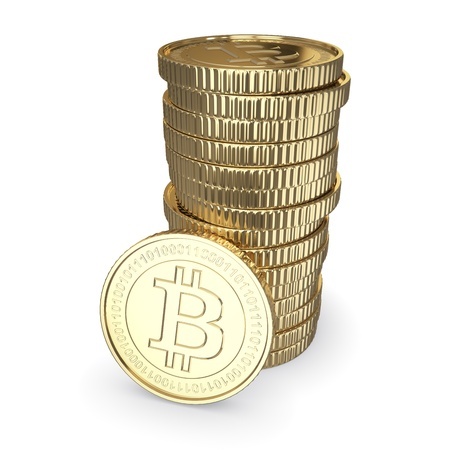 The best way to get comfortable with bitcoin is to just try using it yourself. Even though there are many technological, mathematical and confusing layers to bitcoin, the currency aspect of it is by far the easiest to use and understand.
The best way to get comfortable with bitcoin is to just try using it yourself. Even though there are many technological, mathematical and confusing layers to bitcoin, the currency aspect of it is by far the easiest to use and understand.
With that said, here’s how you can dip your toes in and become a big bitcoin kahuna:
1. Open an account on Coinbase.
2. You will need to buy/exchange bitcoins using your regular currency such as US dollars. To do this you will need to connect your bank account to Coinbase. This is what I did. Also it will ask you to enter your cell phone number for two-factor password authentication to prevent hacking.
3. Decide how many bitcoins you want to buy. I bought 1 whole BTC but you can buy fractions of 1 if it makes you feel comfortable. Choose whatever amount you want. You can always buy more or sell your bitcoins back into dollars.
4. Bitcoins will be deposited in your account. Coinbase will store them for you along with the private key to use them. You can choose to export your bitcoins but you don’t have to. I keep mine at Coinbase.
5. Shop anywhere that accepts bitcoin. I shopped at overstock.com.
6. On overstock.com, I selected the item I wanted and placed it in my shopping cart. For payment method, I selected bitcoin.
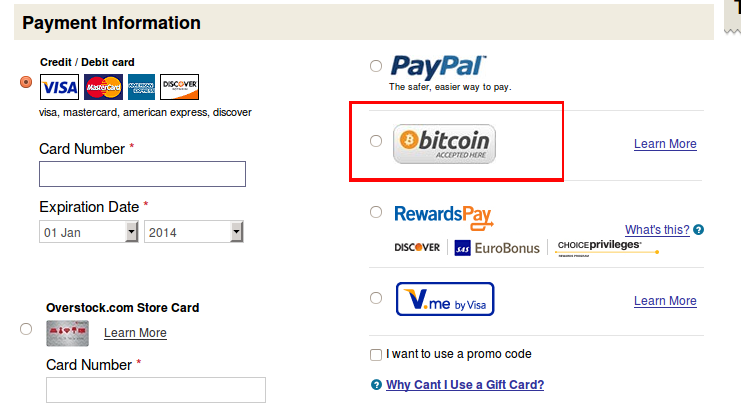
7. There are two ways you can initiate the bitcoin payment to overstock:
— A. Manually send bitcoins to the address provided. A random receiving address is created for each transaction.
— B. Use your Coinbase wallet (the option on the left. This is easiest and what you should do)
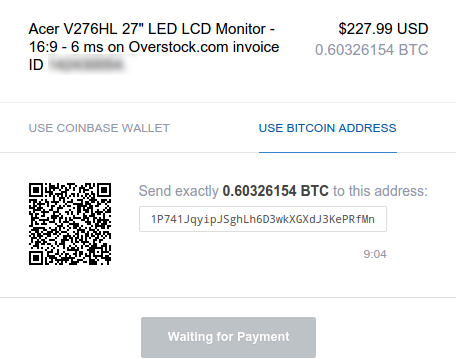
8. If you used option B above, Coinbase will automatically transfer the bitcoins to overstock.com and your order will be placed instantaneously.
All finished. You’ve officially joined the world of bitcoin!
—————–
Need to send a payment manually? It’s easy!
1. Log on to Coinbase.
2. Click “My Wallet” on the left hand side.
3. Click “Send”

4. Make sure you know the recipient’s bitcoin address. If you are making a payment to advertise here on debanked.com, this is an address I will supply you with. Some parties create a unique receiving address for each transaction but they can be reused.
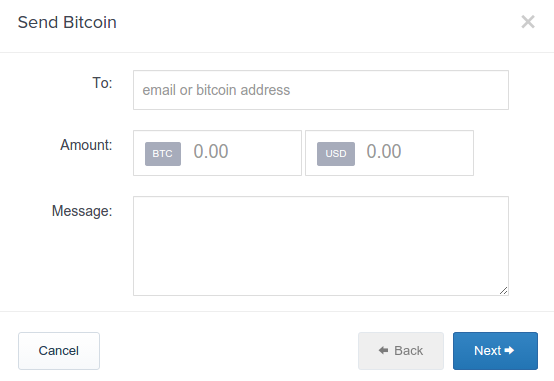
5. Internet connected bitcoin miners around the world will automatically facilitate the transaction. This should take about 10 minutes at most. There is nothing you need to do other than wait for the receiving party to confirm. It is impossible for them to deny receipt of the bitcoins as all transactions are verified and public in the Bitcoin Blockchain.
All finished. You’re now a pro!
My Satoshi Monday
December 3, 2014Call me brave, batshit crazy, or deBanked in the modern era. Earlier this week I wound up at the Bitcoin Center in NYC, a place I didn’t really believe existed. They supposedly host events downtown by Wall Street every Monday and Thursday nights with free alcohol and food.
I don’t believe it, I thought. I called the place ahead of time, twice, half expecting the second attempt to reveal the number was actually out of service. Nevermind the fact that the first time I called, an enthusiastic gentleman was eager to have me stop by.
These bitcoin events start at 7pm. I got there 10 minutes early just to scope the situation out, that way I could escape before anyone knew I was there. Can’t take any chances with these bitcoin people.
But it looked safe. Well, safe enough. The Bitcoin Center is a giant open room on the first floor of 40 Broad Street. The lighting is dark and the floors are pure cement. It could easily double as a handball court or a trading floor, which it kind of is.
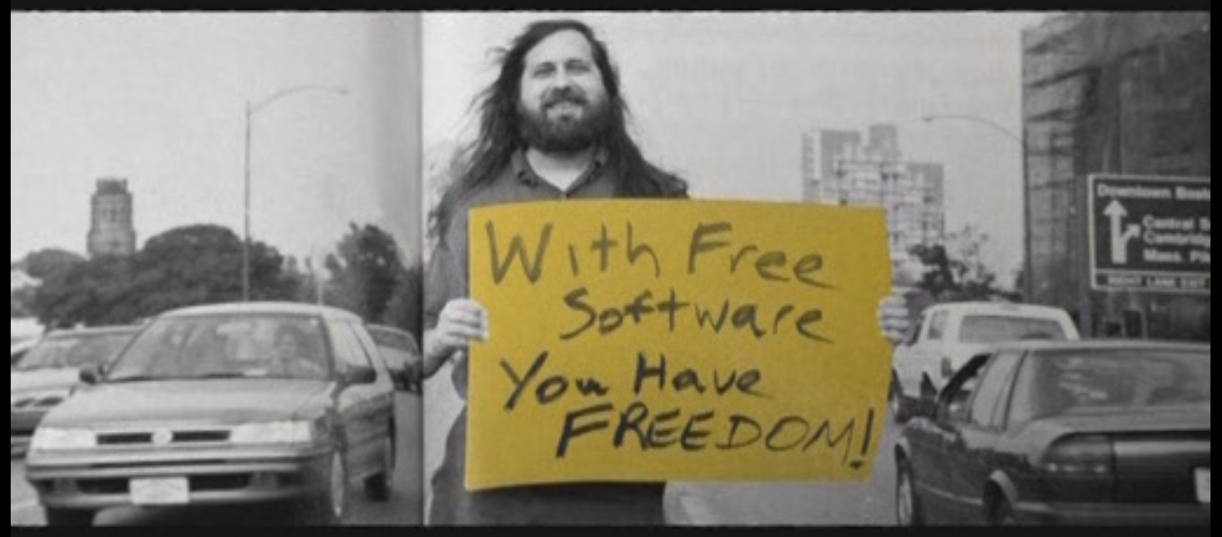 And so I kicked off a Satoshi Monday with a crowd that looked like they were doing unix programming in the 1980s. I was glad I dressed casual. We may have been physically near Wall Street but mentally it was light years away. I half expected Richard Stallman, the legendary icon of the free software movement to pop in and start handing out bitcoins, digitally of course, through some kind of cool free software.
And so I kicked off a Satoshi Monday with a crowd that looked like they were doing unix programming in the 1980s. I was glad I dressed casual. We may have been physically near Wall Street but mentally it was light years away. I half expected Richard Stallman, the legendary icon of the free software movement to pop in and start handing out bitcoins, digitally of course, through some kind of cool free software.
I’ve seen mainstream bitcoin enthusiasts at payments conferences around the country, you know, banker types, but the Bitcoin Center keeps it real. Within 15 minutes of my arrival, I had already had conversations that involved taking down the Federal Reserve, the Koch Brothers, and overthrowing the government. I learned that bankers were poisoning nature and that nature was gearing up for revenge. A war was brewing and you didn’t want to be on the wrong side. “You don’t want to f*ck with nature!” someone screamed.
I had no idea what any of it had to do with bitcoin but the crowd wasn’t all like that. Thank God.
Others gave me the inside scoop on Gems, a company that wants to be the “Bitcoin of social networks”. One fellow bought XGEMS early and if I was smart I should try to pick some up too. Maybe another time…
Cryptocurrencies and cryptoassets of all kinds were uttered. Of course each one seemed to be in presale, was only being offered for a low rate today, or was only open to a select few and for a limited amount of time. If you didn’t get in now, it was too late. The more seemingly elusive they were, the more people wanted to buy them, regardless of whatever they were.
Just as I was beginning to question My Journey to Bitcoin, shit got real. “You selling?” a guy asked me. I assumed he meant drugs. But when he saw how paralyzed I had become, he started to laugh. “I’m talking about bitcoin dude,” you have any to sell?
He wouldn’t be the first to ask me that night. In fact there’s a sizable group of folks that attend just to trade bitcoin. There was even an opening bell and an honorary guest bell-ringer guy to kick off trading.
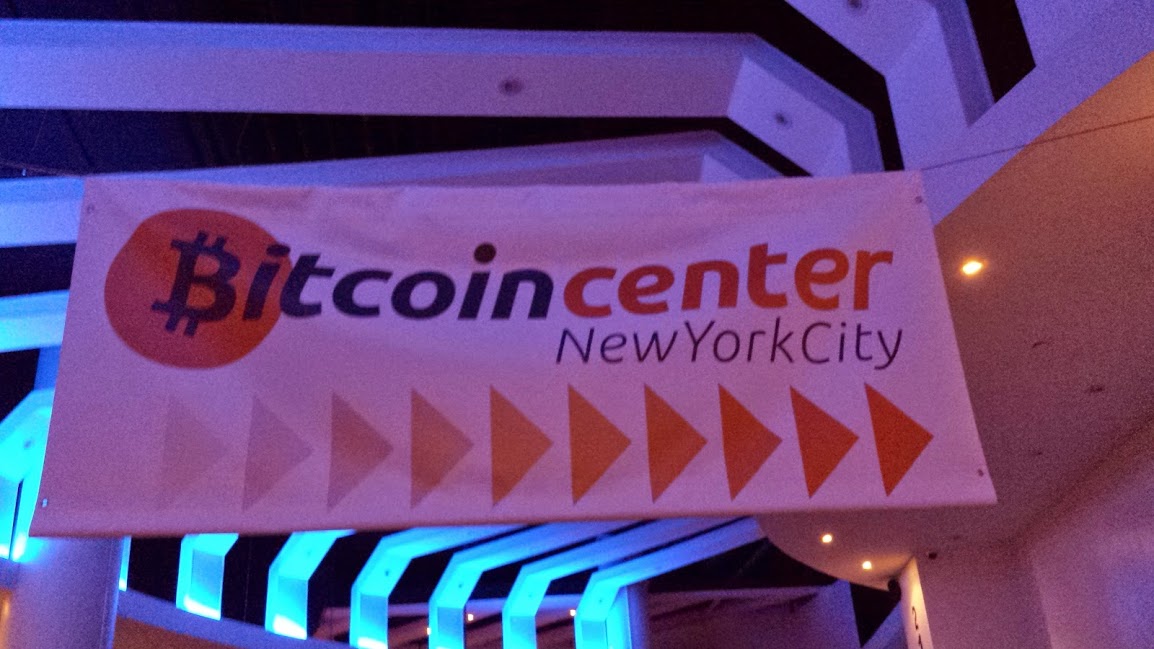 The Bitcoin Center isn’t an exchange though. Any deals made and arranged are between you and another party. Online exchange prices affect the price on the floor but deals made on the floor don’t affect online exchange prices. On Satoshi Mondays, bitcoin goes for cash money.
The Bitcoin Center isn’t an exchange though. Any deals made and arranged are between you and another party. Online exchange prices affect the price on the floor but deals made on the floor don’t affect online exchange prices. On Satoshi Mondays, bitcoin goes for cash money.
I thought it was dumb at first so I asked the next guy that was looking to trade, “Why would I buy bitcoin from random people like you in person when I could just do it online?” I should’ve seen it coming. “Must be easy for people like you who have a bank account,” he responded.
I let that one sink in. Just the day before I had blogged that 25 million Americans are unbanked, meaning they don’t have bank accounts or even access to banking products. This fellow was one of them. He lived off cash but wasn’t letting that stop him from shopping online. He gave you cash, you gave him bitcoins. He stayed unbanked but not cut off from the Internet connected world.
I wanted to ask him why he chose that route over a prepaid debit card, but cards are not a cure-all. Other attendees told me that they buy products overseas and that they were either being charged a huge percentage on top to cover the card processing fees or that merchants had stopped accepting cards altogether. Sure they could make an international wire transfer but even that was a headache for merchants looking to conduct an automated business online.
 Bitcoin was said to be simpler for all involved, something I believe because I purchased a new monitor using bitcoins on Overstock.com just last week. It was actually faster and easier than using a credit card. Seriously. I also saved Overstock on the processing fees. See what a good citizen a bitcoin buyer can be?
Bitcoin was said to be simpler for all involved, something I believe because I purchased a new monitor using bitcoins on Overstock.com just last week. It was actually faster and easier than using a credit card. Seriously. I also saved Overstock on the processing fees. See what a good citizen a bitcoin buyer can be?
An in-person bitcoin exchange also prevents the parties from having to pay an online exchange fee, not to mention that you can gain an edge through negotiating. The liquidity of cash on the spot can create some serious arbitrage opportunities.
People threw down thousands of dollars to buy bitcoins which were then transferred via a mobile app. I probably had enough to do some trading but I didn’t need the cash.
When the free pizza arrived, the crowd turned into a mob. The underbanked it seemed were also underfed and a life of living bitcoin to bitcoin meant this might be the only meal they had for some time. I pushed their weaker counterparts, the unbanked, out of the way to get a hot slice and they pushed me right back.
“Bank account lover!” they shouted. It was a harsh indictment, but they knew. As deBanked as I was, they knew that ultimately I was banked.
Damn.
Some people left right after they ate. Those that remained began to tell me about their digital mining operations, a necessary component of the Blockchain technology that cryptocurrencies like bitcoin are built off of. Bitcoins don’t just magically appear. Computers on the Internet perform wildly difficult mathematical calculations in order to facilitate the creation and transfer of bitcoins. This design is partially why nobody can beat the Bitcoin system.
 One guy told me that he had his basement completely redone so that he could turn it into a mining center. Most mining is done with specialized computer hardware that can perform nothing other than mining. You can actually buy such machines at the Bitcoin Center. If your mining is productive for the system, the system will reward you with bitcoins. The processing power required to solve the complex mathematics makes the odds of being rewarded very low. As time goes on, the system’s equations get more and more difficult to crack.
One guy told me that he had his basement completely redone so that he could turn it into a mining center. Most mining is done with specialized computer hardware that can perform nothing other than mining. You can actually buy such machines at the Bitcoin Center. If your mining is productive for the system, the system will reward you with bitcoins. The processing power required to solve the complex mathematics makes the odds of being rewarded very low. As time goes on, the system’s equations get more and more difficult to crack.
 Some miners are backed by billion dollar investment funds and have a serious advantage in the mathematics arms race. But for those that just casually dabbled in mining, they seemed to be getting a little something from doing it, even if it was small.
Some miners are backed by billion dollar investment funds and have a serious advantage in the mathematics arms race. But for those that just casually dabbled in mining, they seemed to be getting a little something from doing it, even if it was small.
Admittedly one guy talked me into buying mining equipment, something miniscule and inexpensive, a novelty almost. It of course packs so little power that its contribution to the Bitcoin system will be insignificant and will likely yield nothing. I didn’t buy it from him though, I bought it on Amazon. Not taking any chances with the bitcoin weirdos.
I used a prepaid debit card to buy an Amazon gift card which I then used to buy a bitcoin mining machine, or something. I swear I’m not crazy. The moment I clicked buy though, something happened to me. My beard got a little more scraggly, the designer label on my pants faded away, all my past presidential votes magically got switched to Ron Paul, and I finally understood that nature was coming to kill us all.
Well, that’s almost what happened.
The Bitcoin Center might bring out the the industry’s worst stereotypes but between the lines, there’s something there. The unbanked, the merchants/consumers dealing with the costly nightmares of credit card processing, and the freeing feeling of operating outside the traditional banking system. I get it.
And they got me because I was one of the last people to leave that night. Before I knew it, Satoshi Monday almost became Satoshi Tuesday. “Party’s over buddy,” said one of the important Bitcoin Center people. I was ready to go. I really was. I had absorbed a lot. But I had just one more question for him.
“You selling?”
—–
Want to just try it out? Buy just $1 worth of bitcoin on Coinbase. You have nothing to lose by learning.
My Journey to Bitcoin
November 30, 2014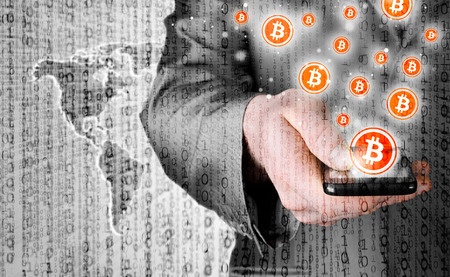 Count me amongst the libertarians, anarchists, and digital lunatics. I made an online purchase using bitcoin… and it was insanely easy.
Count me amongst the libertarians, anarchists, and digital lunatics. I made an online purchase using bitcoin… and it was insanely easy.
The first person I shared my experience with was a friend who works in automotive manufacturing, someone who operates outside the world of alternative finance. He thought I was crazy or rather he was more confused than anything. “Wait, bitcoin?” he asked. “I thought that was a scam that went out of business two years ago.”
Stunned by his remarks and disappointed with his lack of excitement for me, I told a few more friends about what I had accomplished. They had all heard the term, but none of them knew what it was. Oddly, most seemed to believe that bitcoin had already been revealed as a con and was something from years past, a scheme that came, got hacked and failed.
Not so long ago I was in their shoes. I received my first education in bitcoin this past fall, September 22, 2014 to be exact at the 3rd Annual Tomorrow’s Transactions NYC Unconference hosted in Google’s New York headquarters.
It’s a con?
Famous money laundering expert and author Jeffrey Robinson gave a blistering assessment of bitcoin the currency, which he described as a hoax perpetuated by “libertarian anarchists.” His contentious indictment was half warning, half sales pitch for his latest book, BitCon, which I bought the day it was released.
Robinson argued that bitcoin adoption, while minuscule, was still greatly exaggerated.
There are fewer card-carrying members of #BitcoinCanada than #Starbucks in #Calgary. BitCon: http://t.co/lQecBgwRdp
— Jeffrey Robinson (@WritingFactory) November 2, 2014
He explores several challenges in his book, one of which can be summed up as:
Why would someone exchange dollars into bitcoin only to have to convert their bitcoin back into dollars?
It’s a great question, but it’s something I’ve done every time I’ve traveled abroad. Dollars to euros and then euros back to dollars. Dollars to pounds, dollars to canadian dollars, etc. But why do an exchange at all when the counterparty prices their goods or services in dollars?
Spend $ to buy #bitcoin to pay for #Blackfriday stuff priced in $. Where's the logic? #BitCon— Jeffrey Robinson (@WritingFactory) November 29, 2014 http://t.co/U26d35G0u9
Benefits
Assuming bitcoin’s value against the dollar wasn’t volatile, I can think of three immediate reasons:
1. I don’t have to enter in my credit card number on a website and risk it being hacked or stolen.
2. I can make a payment online if I don’t have a credit card or debit card.
3. I can spare the merchant the payment processing fees.
Let’s forget about point one for now because it’s easy to overlook the pervasiveness of point two. According to the FDIC’s latest National Survey of Unbanked and Underbanked, 25 million people in the country do not have access to a bank or banking products at all. Poverty is a main driver of that but curiously 34.2% of respondents in that group cited that they don’t like dealing with banks or don’t trust them as a reason. 30.8% said that account fees were too high or too unpredictable.
And that’s just the unbanked. 1 out every 5 households in the country is underbanked. They have a bank account but have also obtained financial services and products from non-bank alternative financial services providers in the prior 12 months.
To those of us that rely on banks for everything this may seem extreme, perhaps even downright unbelievable. Coincidentally, Robinson wasn’t the only notable figure at the New York Unconference. He was joined by Lisa Servon who later spoke about her hands-on experience with the unbanked and underbanked. A professor of urban policy at the New School in New York, Servon got a job as a check casher/payday lender in a storefront on a busy corner in downtown Berkeley, California to learn about these households on the front lines.
Consumers can be intimidated by banks she said at the Unconference, especially minorities. Even people who can afford to use banks opt not to. A sample of her experience was published a month ago in the New York Times.
Moving on to point three, accepting bitcoin can either be free or vastly less expensive than accepting a credit card payment. Payment processing fees are significant in commerce. I know this because I accept credit card payments through both Square and PayPal in another business I run and it costs me nearly 3% per transaction. I’ve also sold merchant processing for years and have priced hundreds if not thousands of accounts.
You know that thing American Express invented called Small Business Saturday where consumers are encouraged to spend money at small businesses? Paying with your AMEX card is encouraged of course and AMEX charges about 3.5% to the merchants on every sale.
By going dollars->bitcoin->dollars, you can do even more to help small business by saving them the fee. Granted, most consumers probably wouldn’t jump through any hoops to save a business money especially if it meant trying to figure out how to convert your dollars into something they perceive as “a scam that went out of business two years ago.”
I’ve read all the warnings about bitcoin already and have even been lectured by Robinson personally:
@financeguy74 A fool and his money… the numbers don’t lie. Enjoy Vegas.
— Jeffrey Robinson (@WritingFactory) November 4, 2014
and yet what intrigued me most about bitcoin aside from the transaction costs, was the fact that it was not run by a government.
What if?
Five years ago I had a sinking feeling. The safety and security of the U.S. economy was put to the test. Stock prices fell, lending dried up and millions of Americans actually began to ask themselves, what if? As in what if the dollar collapses? What if your bank account suddenly became worthless? What if you had to suffer for the mistakes others in your country made?
In 2009, a colleague and I pledged to stick together should an eventual economic apocalypse happen. Our plan was simple:
1. Exchange all our money for a gigantic gold brick and two shotguns
2. Sit on gold brick and guard it with those shotguns
Survival would remain possible by chiseling off pieces of the gold brick and exchanging them for food and water. We’d each take turns sleeping and hopefully survive until things returned to normal, if ever.
A fantasy to be sure, and it was great for laughs to break up the day, but what if?
My apocalyptic paranoia is one of many stereotypes of the bitcoin faithful, but I have no interest in exchanging 100% of my dollars to bitcoins. And no, I don’t think the dollar is going to collapse tomorrow. I am intrigued however by a currency that eludes governmental control. We can all keep a gold brick in our back pockets, even if it’s small, and even if it’s digital. If for no other reason, it’s a small hedge for peace of mind.
It’s quite ironic that while critics talk up the dollar’s superiority and the strength of the U.S. government, only 14% of Americans approve of how Congress is handling its job. Not to mention that the nation is at this very moment $18 trillion in debt, a number very unlikely to be made whole. Remove the term bitcoin from the conversation and it’s quite likely the average person would at least be amenable to the possibility of a non-governmental currency.
Perhaps as Americans we are somewhat blind to risks, that we feel nothing catastrophic could possibly to happen to us. To many it is literally unthinkable. A completely independent currency has its merits both now and in far bleaker times.
Of course should the apocalypse occur and all you have is bitcoin, rest assured you will be able to buy a shotgun since you can pay for them with bitcoin:
The get rich quick crowd
Here lies another criticism of bitcoin, that everyone is holding it and no one is spending it. Far from idle, there are currently more than 80,000 bitcoin transactions per day. Without prohibitive transaction fees though, volume is a poor measure of adoption since I could easily send bitcoins back and forth between accounts I own and classify them as transactions.
There are indeed those holding and not spending. Rampant speculation is both a cause of volatility and an argument for its long term unsustainability. Speculators are hoping the digital currency will appreciate and make them filthy rich. If that day never comes, a big sell off will cause its value to drop.
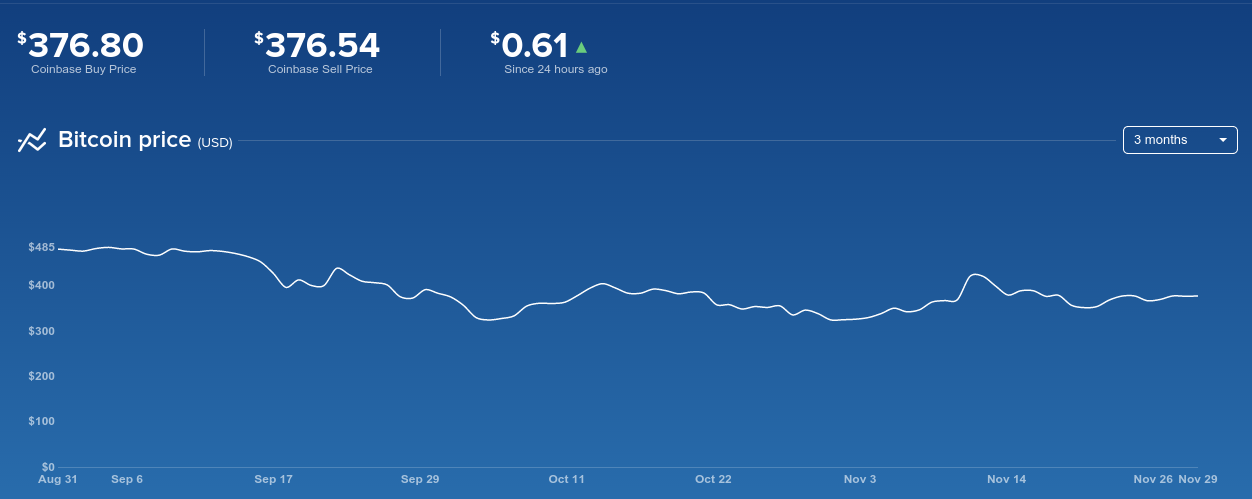
And therein lies the argument… when or if the speculators leave, will that spell the end of bitcoin?
If bitcoin had no practical uses outside of being another digital currency like World of Warcraft gold, then bitcoin would likely be a con, a predictable one that probably would’ve combusted already.
There may actually be a massive market correction in the future. At the current moment, Coinbase reports that 1 btc = $376.23. On November 14th, I paid $397 for 1 btc. It lost about 5% of its value in two weeks, a tough percentage to stomach for the faint of heart, and most certainly the average consumer. It’s also equal to the plunge the S&P 500 took between October 8th and October 16th so such short term volatility exists in other mainstream assets.
I’m not necessarily speculating though. I spent almost half my bitcoins shopping on Overstock on Black Friday, an experience I will detail in another post. A 5% swing might be acceptable for an investment but it’s quite ugly for a currency and this fuels the misinformation that bitcoin is a scam, con, or has already gone out of business two years ago.
1 btc could drop to $100 or $10 after a furious market shakeout and it wouldn’t change how I felt about it. It could also rise back up to $1,000 or higher. That volatility is enticing, almost sexy, but it’s the lack of transaction fees and governance by mathematics rather than actual governments that have me hooked
White knight
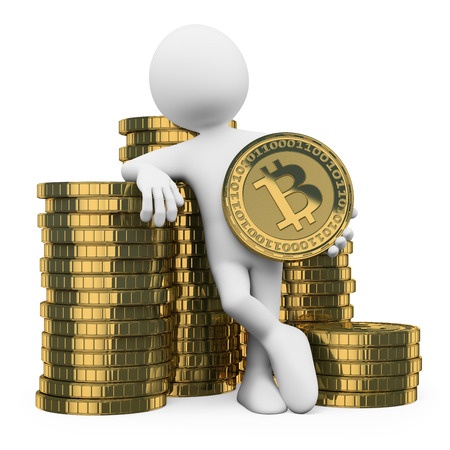 Still, bitcoin is waiting for a few white knights, merchants willing to price their goods and services in bitcoin. For years, I have priced advertisements on this website in dollars, but to show my support, I will soon be pricing them in bitcoin going forward. Dollars will still be accepted of course, but those Paypal fees hurt. Paypal costs me 3% in a split second. Is a 5% loss in bitcoin value over two weeks really that wild by comparison?
Still, bitcoin is waiting for a few white knights, merchants willing to price their goods and services in bitcoin. For years, I have priced advertisements on this website in dollars, but to show my support, I will soon be pricing them in bitcoin going forward. Dollars will still be accepted of course, but those Paypal fees hurt. Paypal costs me 3% in a split second. Is a 5% loss in bitcoin value over two weeks really that wild by comparison?
I think not.
Bitcoin is more than a currency. It’s not the euro, the yen, or the peso. It’s a detachment from governments and banking. It’s self-control. Without the private key, your bitcoins can’t be seized.
We live in a world today where everybody has their hand in your money. Just look at what happens when you pay for a cup of coffee using your credit card. The following parties all get paid a percentage:
- The small business owner
- The small business owner’s merchant account representative
- The merchant account representative’s company (the ISO)
- The payment processor (the processor settling the transaction)
- The acquiring bank (the payment processor’s bank that is authorized to use the payment networks)
- The payment networks (Visa, mastercard, etc.)
- The customer’s card issuing bank (The bank that issued the card to the customer gets a percentage of every sale made with that card)
- The state (where there is sales tax)
If you thought bitcoin was insane, what do you call a system where eight parties need to get paid to facilitate the sale of a cup of coffee? And my example was simple. There are typically more parties involved that that.
I don’t want to give the impression that you can evade taxes with bitcoin. I have every intention to stay on the up and up with governments. But remove the tax man and the merchant from the equation, and one has to wonder what the heck is going on with the other six parties, all of whom will ultimately decide if your transaction is acceptable to them. They decide, not you. They can freeze your funds if they don’t like the transaction and they do. It happens to merchants all the time.
Your money is not really yours. You have rights to it, but only to an extent. It can be garnished, frozen or confiscated. That’s the price of liquidity and relative stability. If you can afford to color outside the lines, where you can remove the six bankers and their control, why not experiment? There’s something pure about it, liberating. And when you add in the fact that it’s governed by math, it’s more than that, it’s beautiful.
deBank
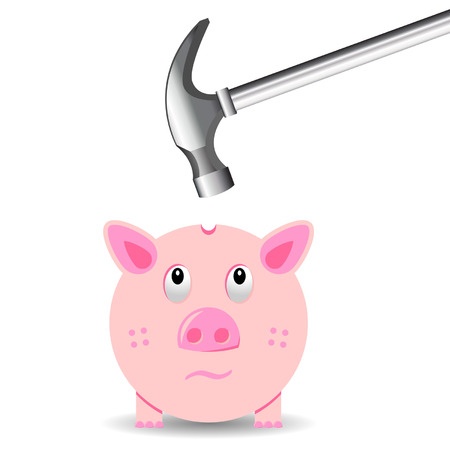 If you are under the impression that bitcoin is intimidating, a scam or out of business, well then I encourage you to step out of governments for a minute, to deBank, and take a walk on the digital side. I’m not going to convert all my dollars to bitcoin and you shouldn’t either. Try it out with some extra cash.
If you are under the impression that bitcoin is intimidating, a scam or out of business, well then I encourage you to step out of governments for a minute, to deBank, and take a walk on the digital side. I’m not going to convert all my dollars to bitcoin and you shouldn’t either. Try it out with some extra cash.
Sure, you’ll be in company with libertarians, anarchists, and lunatics. And yes, there’s the paranoid, the speculators, and those transacting in illicit goods and services. The beginning of the Internet and computers was much the same way with the unix and linux faithful.
Perhaps bitcoin needs a Steve Jobs, a Bill Gates, to package up something simple and suitable for the average household. Every American would appreciate squirreling away a little something that is out of reach of government and banks.
The vast majority of Americans already don’t trust congress, and 92 million Americans are already underbanked or unbanked. In 2014 buying a cup of coffee involves paying eight people and the government has spent $18 trillion that it doesn’t have. You have to start to wonder who the real lunatics are. Consumers are waiting for something… even if it’s just a little peace of mind, a hedge, a gold brick in their back pocket, the feeling of independence, freedom, control. Something…
I deBanked and loved it. Now it’s your turn.





























